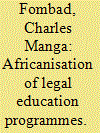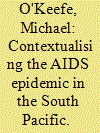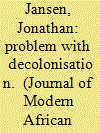| Srl | Item |
| 1 |
ID:
133719


|
|
|
|
|
| Publication |
2014.
|
| Summary/Abstract |
Debates and discussions about the African renaissance and the Africanisation of universities have raged for decades. The goal of developing an emancipatory Afrocentric system that frees African education from the continuous and dominant influence of Euro- and American-centric cultural values remains a challenge. This is particularly so with respect to conventional African legal training and research programmes. Some African legal scholars, sometimes imbued with xenophilia, have in many ways participated in the process that has seen the continuous marginalisation of studies on the law in Africa and African law. This paper argues that there is a need to rethink the place devoted to the study of African law and African legal systems. It contends that African law generally and African legal systems specifically will hardly be able to develop when present-day students spend most of their time, especially in a course such as comparative law, studying western legal systems. In order for African legal education to be relevant and meaningful it must prepare and equip today's lawyers to operate in a global world. It is therefore suggested that an Africanised legal programme should include a course on African legal studies and aim to be contextually and globally relevant whilst being sufficiently innovative and flexible to address the urgent needs of our times.
|
|
|
|
|
|
|
|
|
|
|
|
|
|
|
|
| 2 |
ID:
103590


|
|
|
|
|
| Publication |
2011.
|
| Summary/Abstract |
There is a growing consensus that HIV/AIDS is a 'time bomb' ticking in the South Pacific. This may, in fact, be the case. However, there are at least two major problems with this approach. First, analysis of the implications of the epidemic is based on supposedly concrete links between the epidemic and social, economic and political outcomes. Many of these apparent links have not been established (because the data is not available for the South Pacific). As such, much of the method for analysing the ramifications of the epidemic is borrowed from elsewhere, notably Africa, and the strength of these links is beginning to unravel. Second, research on the vectors of the epidemic that informs this consensus is only as good as the data that it relies on. There are major testing and surveillance gaps in the South Pacific that mean projections are often based on patchy and incomplete data. This can dramatically skew priorities. Reflecting on these problems is important because of the clear ramifications they pose for the development of good public policy in, and toward, the South Pacific.
|
|
|
|
|
|
|
|
|
|
|
|
|
|
|
|
| 3 |
ID:
191855


|
|
|
|
|
| Summary/Abstract |
In the heat of the decolonisation struggles of the 2000s, there has been little space or tolerance for conceptual criticism of this important moment in global history. Using the South African case, this article outlines some of the dilemmas of decolonisation as a concept and method for dealing with legacy knowledge in the aftermath of colonialism and apartheid. The status of whites as citizens rather than colonials, the lack of determination of meanings of decolonisation within public universities, and the defanging of a potentially radical concept are among the concerns raised in this critical work on the uptake of the idea in post-apartheid society. What this criticism points to is the need for a theory of institutions when dealing with radical curriculum change rather than a politics that relies so much on the rhetorical, the symbolic and the performative in the demand for decolonisation.
|
|
|
|
|
|
|
|
|
|
|
|
|
|
|
|